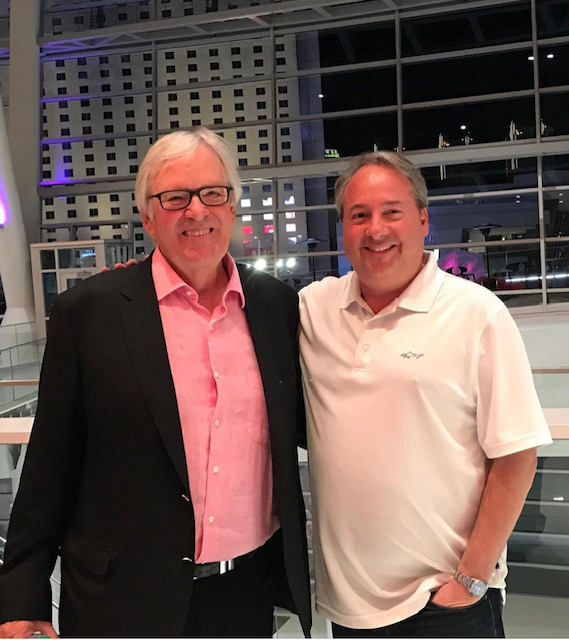Lifestyle
Jay Bloom on Working With Fortune 500 Companies and Keeping It “World Class”

Establishing a classical financial and analytical career has been a passion for entrepreneur Jay Bloom. His experience with Fortune 500 financial institutions has provided a wealth of knowledge that he has used in his business ventures, including Pegasus Group Holdings, which owns and operates utility scale renewable energy installations providing the nations power grid. Each experience has helped Jay grow in his understanding of and appreciation for world-class business operations.
Build Your Portfolio
Jay’s career with Fortune 500 companies began with Manufacturers Hanover Trust Co., which eventually acquired Chemical Bank (which in turn acquired Chase Bank, followed by JP Morgan Chase). Although he started out as an officer for the bank, he was fast-tracked and put into a management and credit training program. He quickly built experiences from there, working with C-level executives on real estate loans and REO portfolios. This experience whet his appetite for more and led to his personal business ventures.
Use the Experience
His background with Fortune 500 companies at the bank gave Jay Bloom a keen understanding of how successful businesses grow and thrive. More and more savvy entrepreneurs are finding this experience to be valuable in creating their own world-class businesses. In fact, according to Neil Patel of the Angels and Entrepreneurs Network, startups are really the next generation of the Fortune 500.
Jay took what he learned in the banking industry and applied it to a wide variety of businesses across industries throughout the years. He has worked with early-stage businesses, mid-cap acquisitions, and venture capital transactions. All of that early work with Fortune 500 companies gave him the tools to create new revenue streams, negotiate deals, and develop successful operations in his own ventures.
Building Your Version of a Fortune 500
Like most savvy entrepreneurs, Jay Bloom is constantly building on past experiences and acquiring new knowledge to expand his opportunities and strengthen deals for himself and his business partners. This has led to great personal and professional successes, such as establishing large utility scale renewable energy installations.
What is a Fortune 500 company, anyway? According to Fortune, the companies on the list represent two-thirds of the U.S. economy; they include some of the biggest, most recognizable names in their industries. Primarily, in today’s world, they are savvy and flexible. They’ve eschewed old models of business and embraced new ones that incorporate technology. They are always ready to pivot to stay on top.
These are the tools that have helped Jay Bloom launch many successful ventures. Incorporating these elements into your own startup can ensure that you’re keeping it world-class.
Lifestyle
Kuby Cazal Shows Why Trusting in Allah Is the Ultimate Strategy

In an online world where entrepreneurship is often measured in Rolexes, rented Lambos, and airport selfies, Kuby Cazal stands out — not because he’s louder, but because he’s real.
He doesn’t flash his wealth. He doesn’t post luxury for the sake of validation. In fact, he’s said in several interviews that he doesn’t want to be known as the guy who flexes with money.
Instead?
He flexes with faith.
Kuby Cazal is a practicing Muslim — and for him, business isn’t just about profits and success. It’s about gratitude, growth, and fulfilling the responsibilities that come with the blessings Allah has given him.
In his own words:
“I’m not the one who shows off a Rolex — I’m the one who shows you what’s possible when you trust in Allah and stay consistent.”
And it shows. While others post stories of flashy lifestyles, Kuby’s focus is on impact. He prays. He fasts. He makes dua for his team. And he constantly reminds his audience that everything he has is from Allah — not from his own effort alone.
Behind the scenes, he’s helped countless dropshippers quietly. No screenshots. No clout. Just support. His message is simple: you can build a business and stay true to your deen.
But it wasn’t always this way. Kuby Cazal himself admits that a few years ago, his connection to Islam wasn’t where it should’ve been. “I prayed sometimes, I skipped sometimes,” he shares. “Now I don’t skip. Because everything I have, everything I am — it’s from Allah. Why would I ever miss thanking Him?”
In a world full of noise, Kuby Cazal is a different kind of entrepreneur. One who doesn’t point to himself as the source of success — but to Allah.
For young Muslims trying to navigate business and faith, he’s proof that you don’t have to sell your soul to build something meaningful. You can work hard, stay humble, and always keep Allah first.
And in Kuby’s case? That’s the biggest flex of all.
-

 Tech4 years ago
Tech4 years agoEffuel Reviews (2021) – Effuel ECO OBD2 Saves Fuel, and Reduce Gas Cost? Effuel Customer Reviews
-

 Tech6 years ago
Tech6 years agoBosch Power Tools India Launches ‘Cordless Matlab Bosch’ Campaign to Demonstrate the Power of Cordless
-

 Lifestyle6 years ago
Lifestyle6 years agoCatholic Cases App brings Church’s Moral Teachings to Androids and iPhones
-

 Lifestyle4 years ago
Lifestyle4 years agoEast Side Hype x Billionaire Boys Club. Hottest New Streetwear Releases in Utah.
-

 Tech7 years ago
Tech7 years agoCloud Buyers & Investors to Profit in the Future
-

 Lifestyle5 years ago
Lifestyle5 years agoThe Midas of Cosmetic Dermatology: Dr. Simon Ourian
-

 Health6 years ago
Health6 years agoCBDistillery Review: Is it a scam?
-

 Entertainment6 years ago
Entertainment6 years agoAvengers Endgame now Available on 123Movies for Download & Streaming for Free
